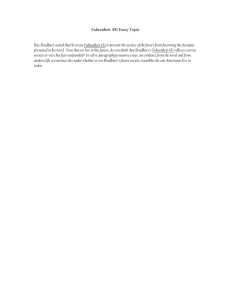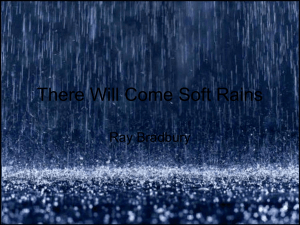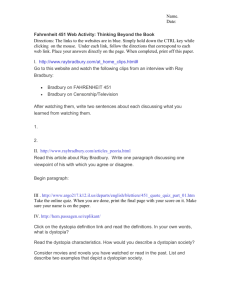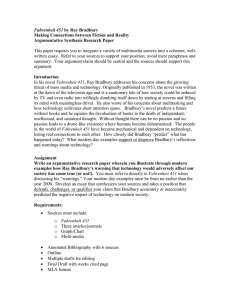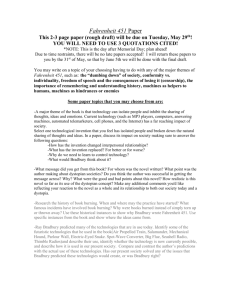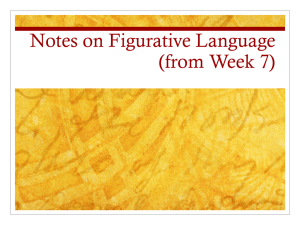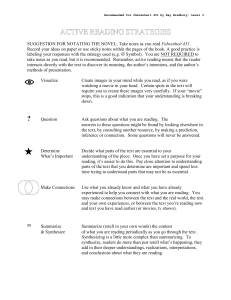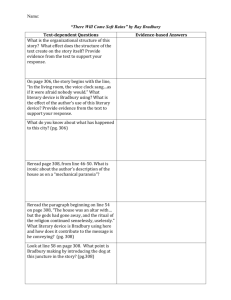Fahrenheit 451 - School District of Clayton
advertisement
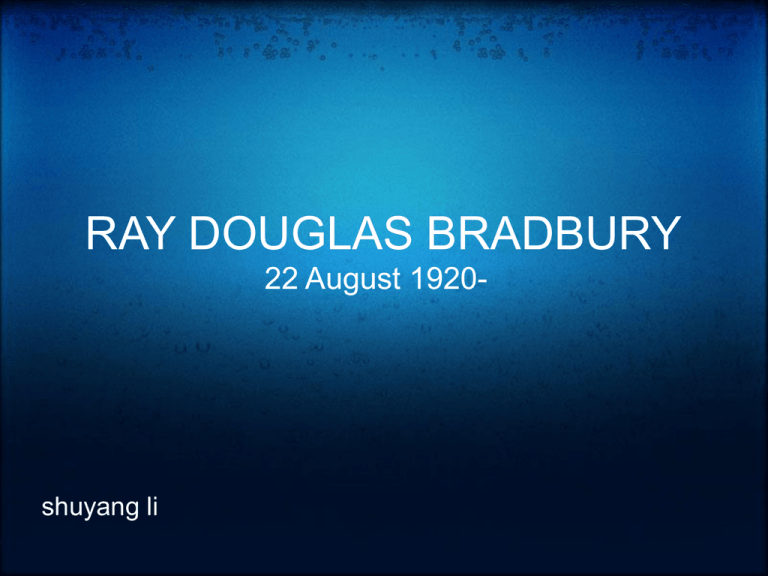
RAY DOUGLAS BRADBURY 22 August 1920- shuyang li the "BIG IDEA" Ray Bradbury is not simply a literary genius in the realm of craftsmanship - rather, he is first and foremost a passionate critic of American Society, unafraid to scrutinize the most ingrained portions of American ideals. Discussion Question I You heard Ray Bradbury state in the interview that the only “realistic” science fiction novel he has written is Fahrenheit 451, that parts of it are happening today. How do you think this connects with the direction that society is moving - is it beneficial? Discussion Question II Television is one facet of modern society that Bradbury despises, a fact that he makes clear in his work. How important is mass media today, and how important do you think it was in society during the 1950s? In connection, how relevant do you think Bradbury’s social criticism is in the modern era? Discussion Question III Read the quotes below. What themes can you link to these quotes? Do you think Bradbury meant to convey these messages as his core idea? “The bigger your market, Montag, the less you handle controversy, remember that! All the minor minor minorities with their navels to be kept clean” (Fahrenheit 451 57) “We must all be alike. Not everyone born free and equal, as the Constitution says, but everyone made equal. Each man the image of every other; then all are happy, for there are no mountains to make them cower, to judge themselves against” (Fahrenheit 451 58) Brief Biography 1920 - born to Ester and Leonard Bradbury 1926 - watches Phantom of the Opera, smitten with theatre 1934 - moves to Los Angeles 1938 - graduates from Los Angeles High School 1941 - first short story to be published, The Pendulum 1946 - meets future wife, Marguerite McClure 1950 - finishes organizing The Martian Chronicles 1953 - finishes writing Fahrenheit 451 1976 - consulted by Disney for EPCOT (Bicentennial) “We must all be alike. Not everyone born free and equal, as the Constitution says, but everyone made equal. Each man the image of every other; then all are happy, for there are no mountains to make them cower, to judge themselves against” (Fahrenheit 451 58) Theses A: Bradbury peered deep into the darkest reaches of the American psyche and emerged enlightened, wielding a rich, provocative, distinctive literary voice born from his haunting life experiences to educate American society about itself-- and in the process turn humanity’s sight to its future. B: With his vast repertoire of literary works still read, analyzed, and considered relevant today, Ray Bradbury's unique and fantastic literary styles and themes makes him a mastery of literature whose work should be regarded as truly classic and worthy of inclusion in the American literary canon. “Nobody knows anyone. Strangers come and violate you. Strangers come and cut your heart out. Strangers come and take your blood. Good God, who were those men? I never saw them before in my life” (Fahrenheit 451 16) “I don’t think it’s social to get a bunch of people together and then not let them talk, do you? An hour of TV class, an hour of basketball...we never ask questions, or at least most don’t; they just run the answers at you, bing, bing, bing, and us sitting there for four more hours of film teacher. That’s not social to me at all” (Bradbury 29) A Critical Viewpoint “No one communicates with anyone else on any but the most superficial level because the senses are completely inundated by constant sound and music blaring from vast TV-walls and transistor radios” (Hamblen 819) “the images drained away, as if the water had been let from a gigantic crystal bowl of hysterical fish...The three women fidgeted and looked nervously at the empty mud-colored walls” (Fahrenheit 451 94) A Critical Viewpoint “the mass media must keep watering down the intellectual level of its material...Bradbury takes this problem to an extreme to show the potential effects of such a course on our culture” (Sisario 201) Why Bradbury? Bradbury and HAL Should Bradbury be taught in Honors American Literature? Yes...and No. -fin-
